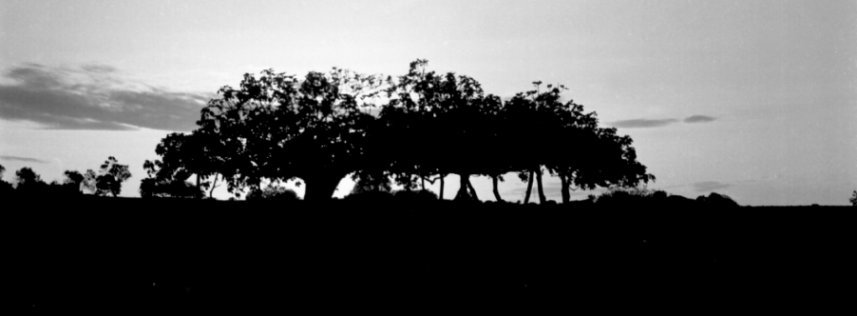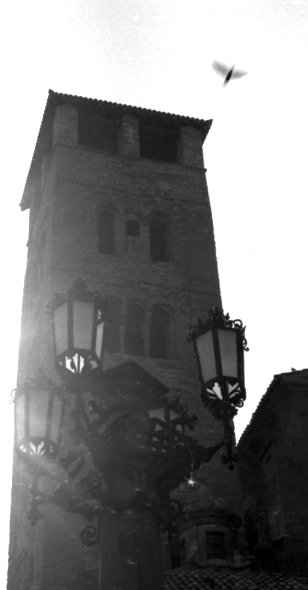In Memoriam (fragment) (1960)
When the war broke out, I was
fourteen years and two months old. At first
it didn't affect me much. My head was
filled with something else, which I still
consider more imporant. I had discovered
Les Fleurs du Mal, and that meant
poetry, of course, but
there was something else, the thing that
really mattered. How shall I say it?
Rebellion? No. That's what they called it then.
Lying inside a chestnut tree, in the center
of a rose with very green, soft leaves, like
skinned-caterpillar fur, there, lying
between the thighs of the world, I engorged
with happy rebellion, while the country
exploded with rebellion and counter-
rebellion, whether they were happy or not
I don't know, but they were more revolutionized
than I was. Moral life, should I say? That's
close but it's too ambiguous. Maybe the best term
is egoism, and it's best to remember that
at fourteen we have to transmute into
the first person - plural seems too tight-fitting,
and the exercise of the singular pinnacle,
the nausea of climbing on top of one's self,
seems to be a good program for the future.
Years go by, and happily
they're left far behind; the hand
caressing the stubborn forehead
of the intimate lamb gets tired,
and we begin to adopt that plural,
I don't know whether from modesty or not,
that renounces the singular, leaves it behind,
but, in gratitude, awards it prizes. Richly.
After the holidays, yes,
I saw that someone had changed
the face of my world. Blood and fire.
It didn't seem horrible to me, but it was
the blood and fire of always. They burned
my priest-run school, and Guiu,
who was the sergeant we had for
premilitary gymnastics, and who we all hated
(I return to the first person plural,
because life always regresses) Guiu had been
shot to death, and they told us that it had
been so hard, because he was wearing
a coat of mail under the old peasant woman
disguise, and in the basket,
under the eggs, he had hidden three grenades.
They killed him in a corner of the little
Plaça d'Hercules, beside the high school,
which is where we had recess between classes,
and I don't remember that the place seemed
marked in any way, nor did we try to find
a bullet in one of the plane tree trunks,
or any other sign. As for blood,
needless to say, the wind carried it away,
maybe the same day - it made the dust
just a little heavier maybe.
The charred walls of the school,
I don't know whether I remember them
or just think I do. We didn't go
into the school. We were in metamorphosis
and weren't interested in old used skins.
We could smell fear - the aroma of that autumn,
but for us it was a good smell. It was
the grownups' fear. We were just getting over
childhood fears and, by luck, everything was
becoming easy. The more afraid they were,
the freer we felt. It was the same
process as always, and we understood
darkly that for us the wheel
was accelerating rapidly. We were happy.
|
In Memoriam (fragment)
Quan va esclatar la guerra, jo tenia
catorze anys i dos mesos. De moment
no em va fer gaire efecte. El cap m'anava
tot ple d'una altre cosa, que ara encara
jutjo més important. Vaig descobrir
Les Fleurs du Mal, i això volia dir
la poesia, certement, però
hi ha una altre cosa,que no sé com dir'ne,
i és la que compta. La revolta? No.
acute;
Així en deia aleshores. Ajagut
dins d'un avellaner, al cor d'una rosa
de fulles moixes i molt verdes, com
pells d'eruga escorxada, allí, ajaçat
a l'entrecuix del món, m'espesseïa
de revolta feliç, mentre el país
espetegave de revolta i contra-
revolta, no sé si feliç, però
més revoltat que no pas jo. La vida
moral? S'hi acosta, però és massa ambigu.
Potser el terme millor és el d'egoisme,
i és millor recordar que als catorze anys
hem de mudar de primera persona:
ja ens estreny el plural, i l'exercici
de l'estilita singular, la nàusea
de l'enfilat a dalt de si mateix,
ens sembla un bon programa pel futur.
Despres v´enen els anys, i feliçment
també s'allunyen, i s'ens va cansant
la mà que acaricia el front tossut
de l'anyell íntim, i ve que adoptem
aquest plural, no sé si de modèstia,
que renuncia al singular, se'n deixa,
però agraint-lo i premiant-lo. Prou.
Acabades les vacances, sí,
vaig veure que al meu món algú li havia
fet una cara nova. Sang i foc.
No em semblaven horribles, però eren
la sang i el foc de sempre. El meu col.legi
de capellans el van cremar, i el Guiu,
que era el sergent que ens feia fer gimnàstica
premilitar, i l'odiàvem tots
(torno al plural primer, perquè la vida
regredeix sempre), el Guiu havia estat
assassinat a trets, i ens van contar
que havia costat molt, perquè portava
cota de malla sota la desfressa
de velleta pagesa, i al cistell,
sota els ous, hi amagava tres granades.
El van matar al racó de la placeta
d'Hèrcules, al costat de l'Institut,
que es on sortiem entre dues classes,
i no recordo que el lloc ens semblés
marcat de cap manera, ni volguéssim
trobar en un tronc d'un plàtan una bala
ni cap altre senyal. Quant a la sang,
no cal dir que, potser el dia mateix,
el vent se la va endur: va fer la pols
potser una mica més pesada.
Les parets socarrades del col.legi,
no sé si les recordo o si m'ho penso.
No hi vam entrar. Fèiem la muda, i no
trobàvem interès en els parracs
de vella pell. Oloràvem la por
que era l'aroma d'aquella tardor,
però ens semblava bona. Era una por
dels grans. Sortíem de la por infantil
i teníem la sort que el món se'ns feia
gairebé del tot fàcil. Com més por
tenien ells, més lliures ens sentíem.
Era el procéss de sempre, i compreníem
obscurament que amb nosaltres la roda
s'accelerava molt. Érem feliços.
|


